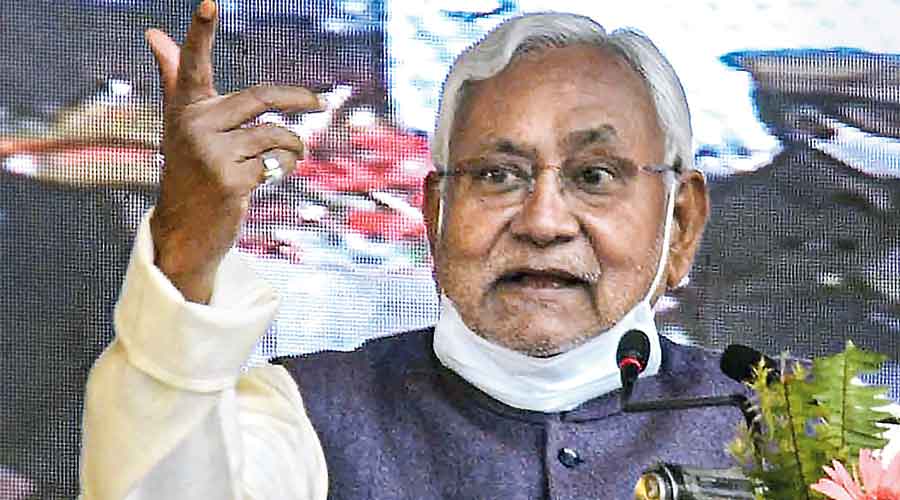Chief minister Nitish Kumar chaired an all-party meeting on caste census on Wednesday and announced that a unanimous decision had been made to conduct it expeditiously in Bihar.
The census will include castes and sub-castes in all religions and the state government will conduct it.
All nine parties present in the legislative Assembly, including Nitish’s Janata Dal United (JDU), Bharatiya Janata Party (BJP), Rashtriya Janata Dal (RJD), Congress, CPI-ML, CPI, CPM, Hindustani Awam Morcha (Secular) and Asaduddin Owaisi’s AIMIM, attended the meeting held at the chief minister’s secretariat in Patna.
“We have taken a unanimous decision to conduct a caste-based census. We will work expeditiously on it on a large scale. All castes and sub-castes across all communities will be enumerated. Nobody will be left out. We will take the state cabinet’s approval for it on the basis of today’s meeting and also fix a deadline for its completion,” Nitish told reporters after the meeting.
The chief minister pointed out that the money required to conduct the caste-based census would be spent by the state government and the people involved in the exercise would be trained for it.
“We will publish advertisements on the census so that everybody understands about it. Every single thing related to it will be put in the public domain. We will do it through social media also. All the nine parties in the Assembly would be kept informed,” said Nitish.
Senior leaders from the BJP, deputy chief minister Tarkishore Prasad and state unit president Sanjay Jaiswal, leader of Opposition Tejashwi Prasad Yadav and others were present by his side.
Nitish clarified that the delay in the all-party meet was a result of the back-to-back local body polls and MLC elections. He also asserted that a cabinet meeting on the caste-based census would be held soon.
Nitish and RJD chief Lalu Prasad have been demanding a caste-based census for around a decade now, arguing that it would help in finding out the population of every caste, their level of progress, and enable the formulation of development policies in a better manner.
The demand was robust prior to the 2014 Lok Sabha elections, but went into hibernation afterwards. It surfaced again last year and intensified. Nitish led an all-party delegation to meet Prime Minister Narendra Modi in August 2021.
However, the Centre informed Parliament that it had no plans to conduct any enumeration of castes in the country other than the Scheduled Castes and the Scheduled Tribes. It also said the states could conduct it on their own if they wished.
Later, the BJP leaders spoke against the need for a caste-census and said their party intended to work for the development of all castes. However, the other parties, including the JDU and the RJD decided to go ahead with it in the state.
Politics in Bihar has been caste-ridden with all parties paying attention to castes in the selection of candidates. Voting has also been largely along the caste-lines.
However, with the BJP’s “nationalist-religious-communal” agendas trying to make inroads in Bihar too, parties such as JDU and RJD felt threatened about their survival and started looking to counter it with caste-based politics. The caste census is a part of their plan.
The RJD and other parties have already voiced their support for a reservation policy based on the numerical strength and percentage population of castes.
Including all religions within the ambit of the caste-based census is being seen as Nitish’s masterstroke as it will further undermine the BJP’s efforts to polarise people on religious or communal lines.
Sensing that it could lose electoral ground in Bihar, the BJP did a volte-face. Its state leadership came out in support of caste census and participated in the all-party meeting.
Asked about the BJP’s opposition to the caste census, Nitish said: “Everybody has concurred on conducting a caste-based census. The decision has been unanimous. There is no problem. The BJP people are also with us.”
The chief minister also said the similar names of sub-castes are present across different castes and proper attention would be paid while enumerating them.
“Our intention is to take the people on the path of progress, to ensure that everybody develops properly and nobody is left out. The caste-based census will reveal who are the poor,” Nitish added.
The last caste census in the country was conducted in 1931. It had put the Backward Castes population at around 52 per cent. The data became the backbone of the reservation policy of the central and the state governments.











